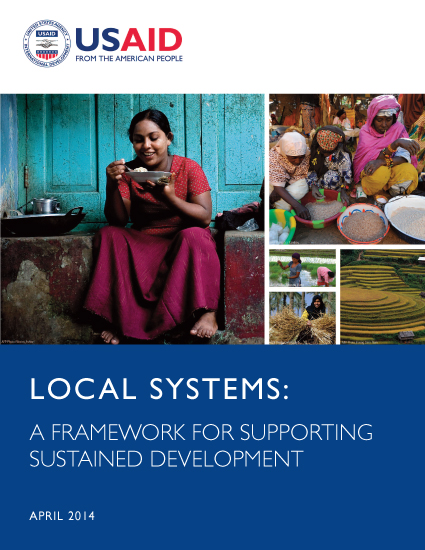Speeches Shim
This Framework describes USAID’s overarching approach to transforming innovations and reforms into sustained development.Drawing upon USAID’s experience, established good practice and systems thinking, this Framework places local systems at the center of all our efforts to promote sustainability.
The focus on local systems is rooted in the reality that achieving and sustaining any development outcome depends on the contributions of multiple and interconnected actors. Building the capacity of a single actor or strengthening a single relationship is insufficient. Rather, the focus must be on the system as a whole: the actors, their interrelationships and the incentives that guide them. Realizing improved development outcomes emanates from increasing the performance of multiple actors and the effectiveness of their interactions.And sustaining development outcomes depends on the sustainability of the local system— specifically, its built-in durability and adaptability that allows actors and their interrelationships to accommodate shocks and respond to changing circumstances.
This Framework contributes to the ongoing transformation of the way theAgency does business by defining clear and practical steps toward realizing a vision of development that is locally owned, locally led and locally sustained.
Ten Principles for Engaging Local Systems
- Recognize there is always a system.
- Engage local systems everywhere.
- Capitalize on our convening authority.
- Tap into local knowledge.
- Map local systems.
- Design holistically.
- Ensure accountability.
- Embed flexibility.
- Embrace facilitation.
- Monitor and evaluate for sustainability.
These steps include: (1) adhering to good practice in engaging local systems (see Box 1); (2) modifying theAgency’s risk assessment process to take better account of rewards as well as risks and to better enable us to direct our resources where they are most likely to catalyze sustained development; and (3) broadening our results architecture to track our contributions to the strength and sustainability of local systems.Ultimately, effective and empowered local systems are essential to sustainably fulfilling our mission to partner to end extreme poverty and to build resilient, democratic societies.
The Framework also defines how we will advance aid effectiveness and serves as the basis for deeper collaboration with all partners to support sustainability though local systems.The Framework concludes with a series of follow-on steps—some already underway—that will help us make progress.


Comment
Make a general inquiry or suggest an improvement.